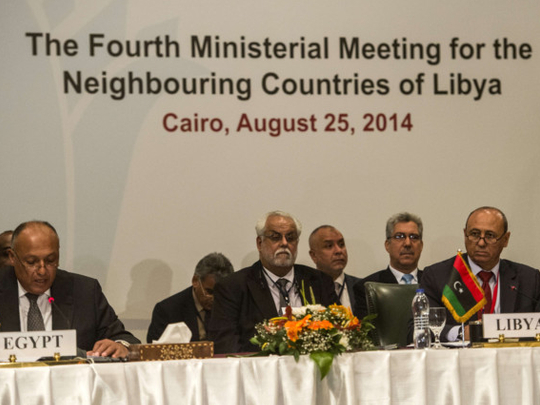
Cairo: Egypt warned on Monday that a spillover of lawlessness from Libya could prompt foreign intervention, saying this should be avoided as diplomats discussed the spiralling violence in the North African country.
Egypt’s Foreign Minister Sameh Shoukri spoke at the opening session of the meeting with the foreign ministers of Libya’s neighbouring countries, two days after Cairo denied Islamist militia accusations that it had conducted an air strike against Islamists in Tripoli.
Libya’s government considers the militias as ‘terrorists’ and say fight against them is legitimate.
The Cairo meeting of foreign ministers came after Islamist militias said they had seized the airport in the Libyan capital.
“We have felt the effects of the escalating Libyan situation on the security of neighbouring countries through the presence of extremist and terrorist elements which extended to other countries through arms dealing and trafficking,” Shoukri said.
“This affects the sovereignty of neighbouring countries and threatens their stability. This could affect the interests of other countries outside the region and could lead to forms of intervention in Libyan affairs, which should be avoided.”
An Egyptian proposal to disarm competing Libyan militias “simultaneously and without discrimination” will be discussed at the meeting of foreign ministers of Libya’s six neighbours, Shoukri said.
Libyan Foreign Minister Mohammad Abdul Aziz told journalists after meeting Shoukri that political coordination between the two countries was required as “the escalating security situation in Libya has a negative effect on Egypt’s national security”.
Abdul Aziz added that his country awaited a UN Security Council resolution that would send a “strong message” to end the fighting in Libya.
“There should be an effective dialogue in addition to international involvement in the long run to reconstruct the country’s institutions,” he said.
The United Nations Support Mission in Libya on August 17 condemned the deadly clashes between Islamist and nationalist militias that have surged following the ouster in 2011 of dictator Muammar Gaddafi, and “urged both parties to lay down their arms and observe a ceasefire”.












